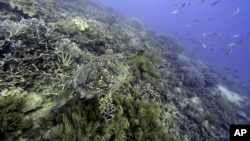An Australian study published Thursday found that up to 138 shallow-water reef species that have suffered sharp declines in the past 10 years now qualify as endangered or critically endangered.
The Reef Life Survey found that larger fish have shown a greater decline than smaller varieties — most likely because of a combination of overfishing and climate change. Pollution and development are also factors.
In what the survey’s authors say is a clear sign of global warming, population declines are disproportionately affecting marine species in cooler conditions off southern Australia.
There is a warning that more than 30% of invertebrates in the region’s cool, shallow waters are now considered to be at high risk of extinction.
Graham Edgar, a senior research fellow at the University of Tasmania, is the study’s lead author.
“The declines were much more pronounced along the southern Australian coast than in the tropical waters,” Edgar told the Australian Broadcasting Corp. “So, regardless of all the attention paid to the Great Barrier Reef, which is deserved in terms of the impacts that are occurring there with heatwaves, we found that species along the southern Australian coast showed even greater declines in general.”
Researchers say that more marine animals and plants in Australia are migrating south to avoid warmer sea temperatures. They caution, however, that species in cooler waters are facing so-called “climate traps,” or geophysical barriers stopping them from moving, such as water temperature or salinity.
Edgar warned that warmer ocean temperatures were “starting to push species to their limits.”
The Reef Life Survey analyzed more than 1,000 species at around 1,600 locations. The field work was undertaken by about 100 recreational divers trained to collect scientific data.
The results are published in the journal Nature.





